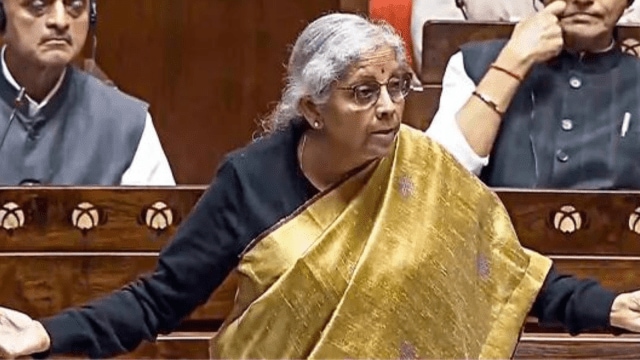Union Budget 2024 Expectations: Industry leaders share their wishlist
On the expected lines, Sitharaman had already ruled out any “spectacular announcements” ahead of the big day. However, industry leaders across sectors are keenly waiting to see what this vote-on-account or interim budget holds for them.
 File Image: Finance Minister Nirmala Sitharaman
File Image: Finance Minister Nirmala SitharamanUnion Finance Minister Nirmala Sitharaman is set to table the interim Budget 2024-25 on February 1 ahead of the Lok Sabha polls. While Sitharaman has already ruled out any “spectacular announcements” ahead of the big day, industry leaders across sectors are keenly waiting to see what this vote-on-account or interim budget holds for them. This report will highlight key expectations from prominent leaders from the interim budget, based on pre-budget consultations, industry reports, and ongoing Q3 earnings.
1) Logistics Sector
Mahindra Logistics
One of the biggest logistics companies in the company, Mahindra Logistics has pitched for prioritising capital expenditure in prominent infrastructure projects and more financial incentives for the sector. The company is expecting more tax incentives, charging infrastructure subsidies, and financial support for R&D for the EV industry.
As per the Mahindra group company, the budget should focus on domestic manufacturing, growth in fulfilment logistics, and multi-modal transportation adoption in the industry.
“The upcoming interim budget offers a unique opportunity to balance economic growth priorities and fiscal consolidation. Prioritising capital expenditure in key infrastructure projects, alongside financial incentives like PLI, tax benefits, and subsidies, can drive innovation in logistics. Building a ‘One India’ logistics ecosystem and integrating initiatives like the National Logistics Policy and Sagarmala Project are crucial to enhancing India’s global Logistics Performance Index ranking.”
“A holistic regulatory framework for last-mile delivery and formal recognition of the gig workforce under labour laws are essential for fair employment practices in the Digital Economy,” it added.
FedEx
Transportation and e-commerce giant FedEx is expecting digitisation of the sector to accelerate speed and ease of doing business and initiatives that will sustainably boost manufacturing and trade. The company also advocates for a strategic allocation towards infrastructure development for more efficient multimodal logistics.
“We urge a consistent budgetary emphasis on expanding airport infrastructure for cargo, strengthening regional airports and developing dedicated transshipment hubs to optimise belly and freight capacities. We underscore the importance of digitally advancing customs clearance processes through cutting-edge technologies such as artificial intelligence, machine learning, blockchain, and big data. This approach promises improved risk management, compliance, efficiency, and analytics,” said Kami Viswanathan of FedEx Express.
2) Internet and Telecom
Broadband service provider Netplus believes that the forthcoming budget should prioritise strategic allocations in the sector with an aim to bridge the digital gap, thus securing a more inclusive digital future.
“Recent figures underscore the escalating demand for robust digital infrastructure, with a notable surge in internet usage across sectors. The pandemic-induced shift towards remote work, online education, and telemedicine has emphasized the need for expanded broadband accessibility. Investing in broadband expansion is not just a technological imperative; it’s an economic necessity. Studies indicate that for every 10% increase in broadband penetration, there is a potential GDP growth of 1–1.5%. However, challenges persist, such as the digital divide, where underserved communities face limited access,” said Gurdeep Singh, Chairman and founder of Netplus.
BIF
Policy and regulatory think tank Broadband India Forum (BIF) believes that the government should facilitate affordable broadband through Satcom and budgetary support for the growth of Public Wi-Fi, and reduction in statutory fees and levies and exemption of GST on service revenues.
T V Ramachandran, President of BIF, said, “India is undergoing rapid digital transformation on the back of continuous Government reforms. The recently notified Telecommunications Act 2023 is a game changer and will help catalyze the growth of the sector even further.”
“With the above measures, we hope that the Union Budget will help accelerate the momentum of the reforms in the sector which has been set by other Government policies & measures,” he added.
Fujitsu
Japanese information and communication technology company Fujitsu said budget 2024 can play a key role in facilitating the growth and sustainable development of Global Capability Centers (GCCs). GCCs which require support and investment for infrastructure and growth environment, government further scale and accelerate innovation at a faster rate as India emerges as the world’s technology and services hub.
“Major economies across the world are seeing a challenging macroeconomic situation with slowdowns that have affected various industries. Amid this period, it is the tech industry that is leading the charge in recovery with a positive outlook. The demand for IT skills, especially in the new-age technologies – AI, ML, analytics, data science and other digital capabilities continues to surge presenting an opportune time to GCCs to further scale and usher in the next phase of digital revolution in India. India is a leading hub of Global Capability Centers (GCCs) with 1500+ GCCs housed in India that play a crucial role in growth of the tech industry,” Manoj Nair, Head of Global Delivery Centres of Fujitsu.
STT GDC
The Indian subsidiary of a Singaporean company, STT GDC expects the interim budget to spur domestic manufacturing and infrastructure through special incentives.
“We are hopeful of incentives to spur domestic manufacturing and infrastructure builds specially tailored for data centers’ massive scale and seamless connectivity needs. Attractive capital subsidies for setting up future-ready facilities and easy financing options to offset development costs will unleash growth. We also envision provisions that encourage the adoption of renewable energy to meet data centers’ clean power appetites. Additionally, preferential procurement directives favoring home-grown data centers will provide an upside. With an emphasis on nurturing a cutting-edge domestic data center industry, India can swiftly go up the technology value chain and cement dominance in delivering digital services globally. Having granted an infrastructure tag has remarkably expedited logistics, ” Bimal Khandelwal, (Chief Financial Officer, STT GDC India) said.
3) Education
NIIT
Leading skills & and talent development corporation, NIIT expects the government to hike budgetary allocation for education to 6 per cent of GDP.
“I look forward to the forthcoming budget with the expectation that it will align with the National Education Policy (NEP) 2020. A substantial increase in budgetary allocation for education, from 2.9% to 6% of the GDP, is crucial for the policy to deliver its full potential and attain national objectives on the path to global leadership,” said Chairman Rajendra S Pawar
4) Consumer Durables
One of the leading manufacturers of consumer durables, Super Plastronics Pvt Ltd is expecting a low corporate tax rate to incentivise both global and domestic businesses to establish manufacturing facilities in the country and maintain price competitiveness.
“This would further advance the “Made in India” campaign and encourage businesses to introduce cutting-edge and technological know-how to India, improving productivity and quality. Additionally, it is very important to scale the existing PLI scheme for electronics to encourage Indian manufacturers,” said Pallavi Singh, Senior Vice President of Super Plastronics Pvt Ltd.
5) BFSI and Digital Payments
TAC Security
Cybersecurity SaaS startup, TAC Infosec Limited, known as TAC Security is expecting the center to address the issue of cyber-attacks by developing strict cybersecurity protocols, and enforcing steps to prevent growing risks to effectively address cyber-attacks.
” TAC Security urgently draws attention to the critical issues plaguing the BFSI and Digital Payment domains, resulting in staggering losses of $9 billion in India and rampant cases of data and identity theft. Given India’s aspirational target of building an economy valued at $10 trillion by 2030, it is critical to acknowledge the crucial role that FinTech will play in this development trajectory,” said Trishneet Aroora, Founder & CEO of TAC Security
” TAC Security proposes that the government develops strict cybersecurity protocols, encourages stakeholder participation, and enforces steps to prevent growing risks to effectively address cyber-attacks. It is stressed that funding cybersecurity research and education is a crucial tactic for enabling enterprises to proactively defend against new threats.”
6) Real Estate
NAREDCO Maharashtra
India’s real estate industry, like other sectors, is eagerly anticipating the 2024-25 budget announcements instrumental for sustaining the growth momentum. The industry had been long calling for a relook at the definition of “affordable housing”, the term last defined in 2017.
“A major focal point for the Government continues to be affordable housing. We suggest an increase in the cap for interest rate deduction under section 24(b) from Rs. 2 lakh to Rs. 5 lakh per annum. Additionally, there’s a call to redefine the definition of affordable housing, proposing an increase in the cap from Rs. 45 lakh to Rs. 1 crore, particularly in metro cities. This change is expected to significantly boost both affordable and mid-segment housing,” Sandeep Runwal, President of NAREDCO Maharashtra.
“The industry also anticipates the continuation of incentives for affordable rental housing schemes. Tax reliefs for such projects could accelerate investment and aid in achieving the Government’s ambitious ‘Housing for All’ goal. Further expectations include tax benefits for first-time homebuyers and the re-introduction of GST with an input tax credit on under-construction properties. These measures are anticipated to stimulate demand among homebuyers,” he added.
Siddha Group
“A key focus is on enhancing the access of first-time homebuyers to affordable housing, particularly in metropolitan cities. The industry is hopeful for an upward revision of the cap in the credit link subsidy scheme, along with the introduction of tax benefits for first-time homebuyers. Such measures are seen as pivotal in sustaining the sector’s momentum,” said Samyak Jain, Director of Siddha Group.
“Moreover, increased budget allocation towards infrastructure development in Mumbai is also required. Improved infrastructure is expected not only to enhance connectivity and ease travel for residents but also to trigger a surge in housing demand across the city.”
Atul Projects
“However, the expiry of several incentives for developers and consumers in the past one to two years has highlighted the need for renewed and extended benefits. Critical measures, such as tax breaks for affordable housing development and acquisition, are seen as crucial for the sector’s continued vitality,” said Aakash Patel, Director of Atul Projects India.
“The residential real estate market in India has become increasingly appealing to Non-Resident Indians (NRIs), thanks to improved transparency from the Real Estate Regulation and Development Act (RERA) and relaxed investment norms. NRIs are looking forward to the budget, hoping for incentives such as easier tax compliance and reduced withholding tax rates.”
7) Influencer Marketing Platform
Influencer Marketing Platforms are demanding acknowledgement for the role in the digital era and a clear established guidelines regarding practises.
“As we approach the forthcoming Union Budget 2024, it is critical to acknowledge the instrumental role of influencers in driving digital growth, especially in tier-II and Tier-III markets. We anticipate relaxations for micro-influencers, which can potentially lead to unprecedented growth in this industry. Furthermore, the establishment of clear guidelines and regulations specific to influencer marketing practices could provide stability and help instill a sense of professionalism within the industry,” said Sumit Gupta, Founder Viral Pitch.



- 01
- 02
- 03
- 04
- 05




























